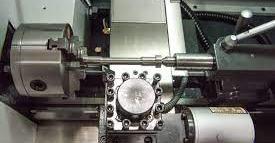As part of research and development (R&D), tensile testing assesses a material’s resistance to mechanical forces. A specimen’s quality directly affects the accuracy of these tests. Sample preparation isn’t just the beginning; it’s the foundation of the entire process. It’s essential that each specimen remains uniform, keeps standards, and maintains high quality. Computer Numerical Control (CNC) machines like the Round & Flat Specimen Preparation Machines have radically changed specimen preparation, emphasizing accuracy. This article explores the profound influence of CNC technologies on testing within R&D contexts.
The Importance of Precise Sample Preparation in Tensile Testing
In the complex world of R&D, where every detail matters, tensile samples’ precision directly influences test results’ accuracy. If a sample is even slightly inconsistent or imperfect, it can lead to data that is not representative of the material’s true properties. This can have severe effects, especially in industries where material strength is critical, such as aerospace or automotive manufacturing.
The preparation phase ensures that the specimen aligns with internationally recognized standards, allowing for accurate results across various tests. Traditional methods, though effective, might not provide the speed or precision modern R&D processes demand. This is where CNC technologies, particularly Round & Flat Specimen Preparation Machines, play a crucial role. Their capability to consistently produce specimens of exact dimensions and finishes reduces the margin of error, ensuring that tensile testing outcomes are both reliable and repeatable.
Exploring Flat Specimen Preparation Machine in Tensile Sample Preparation
Flat tensile specimens, typically used in standard tensile testing applications, require a careful preparation process to ensure they accurately represent the material from which they’re extracted. Flat CNC machines in this context are transformative. These machines, equipped with advanced cutting tools and precise control systems, can craft flat specimens with exceptional accuracy.
Flat Specimen Preparation Machines make it considerably easier to achieve precise dimensions and finish essential for reliable testing. Automated processes reduce human error, resulting in specimens that perfectly match the required standards. Furthermore, their speed and efficiency ensure that even large amounts of samples can be prepared in significantly less time than traditional methods. This not only accelerates the R&D timeline but also ensures consistency across all specimens, which is pivotal for trustworthy tensile testing results.
About Round CNC’s Role in Tensile Sample Preparation
Round tensile specimens serve specific testing purposes and have a different set of preparation requirements. CNC machines have quickly become a cornerstone in preparing such specimens. Their agility and precision are unmatched when it comes to shaping round, square, or even irregular stock materials into the exact specifications needed for tensile tests.
The advantages of using Round Specimen Preparation Machines are numerous. Firstly, they are equipped with precision cutting tools that craft specimens with sharp accuracy. This ensures that every sample mirrors the tensile testing standards. Moreover, integrated user-friendly software simplifies the operation process, making it easier for operators to achieve desired outcomes consistently.
Combined Benefits of Using Both CNC Types
Utilizing both Round and Flat Specimen Preparation Machines in combination offers R&D facilities a comprehensive solution for tensile testing sample preparation. Each system brings its unique strengths to the table, but together, they offer solutions to a wide range of testing requirements.
The Round Specimen Preparation Machine adapts to varied stock shapes. Whether dealing with round, square, or irregularly shaped materials, this CNC ensures consistent quality of each prepared sample. Its design prioritizes precision, minimizing errors that might compromise the tensile test integrity.
Conversely, the Flat Specimen Preparation System focuses on producing perfectly consistent flat samples, a crucial requirement in many R&D settings. Its specialization ensures flat specimens are crafted with exceptional precision, ensuring uniformity of samples in tests.
The role of precise sample preparation and tensile testing equipment cannot be overstated. In R&D, where accurate tensile testing is paramount, precise sample preparation cannot be overstated. The introduction and integration of both Round and Flat Specimen Preparation Machines have elevated the standards of testing. These CNC machines not only guarantee specimen consistency and quality but also enhance efficiency, allowing researchers to trust their results. As tensile testing continues to play a key role in material evaluations and advancements, ensuring the use of top-tier preparation systems like these becomes all the more crucial. Embracing such technological advancements ensures that the R&D sector remains at the leading edge of innovation. This is done by continually pushing the boundaries of material science and engineering.
